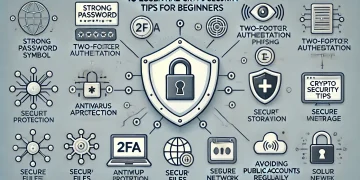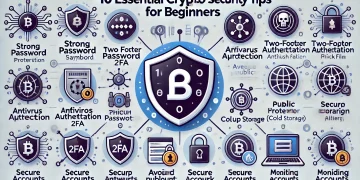The rise of cryptocurrency has led to an ever-growing need for secure and efficient wallets to manage digital assets. With new wallets launching frequently and others evolving to include advanced security measures and user-friendly interfaces, it’s essential to understand which cryptocurrency wallets are leading the pack in 2024.
In this guide, we will dive into the best cryptocurrency wallets of 2024, analyzing their features, security, user experience, and why they stand out in the crypto space.
Table of Contents
- What is a Cryptocurrency Wallet?
- Types of Cryptocurrency Wallets
- a. Hot Wallets
- b. Cold Wallets
- Key Features to Look for in a Cryptocurrency Wallet
- a. Security
- b. Compatibility
- c. User Experience
- d. Backup and Recovery
- e. Fees and Accessibility
- Top 10 Cryptocurrency Wallets of 2024
- a. Ledger Nano X
- b. Trezor Model T
- c. MetaMask
- d. Trust Wallet
- e. Exodus
- f. Coinbase Wallet
- g. Electrum
- h. Atomic Wallet
- i. Mycelium
- j. SafePal
- Hardware vs. Software Wallets: Which is Better?
- How to Choose the Right Cryptocurrency Wallet
- a. Purpose
- b. Asset Support
- c. Reputation and Reviews
- Security Tips for Protecting Your Crypto Assets
- Frequently Asked Questions (FAQs)
- Conclusion
1. What is a Cryptocurrency Wallet?
A cryptocurrency wallet is a digital tool that allows users to store, send, and receive various digital currencies like Bitcoin, Ethereum, and other altcoins. Unlike traditional wallets, these don’t store the actual currency. Instead, they store private and public keys that provide access to your digital assets on the blockchain. The wallet ensures that only the rightful owner can access or transfer these assets.
There are two major types of cryptocurrency wallets: hot wallets, which are connected to the internet, and cold wallets, which are offline and provide a higher level of security.
2. Types of Cryptocurrency Wallets
a. Hot Wallets
Hot wallets are digital wallets connected to the internet, allowing users to quickly and easily access their cryptocurrencies. They are suitable for those who make frequent transactions or need constant access to their crypto holdings. Hot wallets come in the form of web apps, mobile apps, or desktop programs.
However, the biggest drawback of hot wallets is their susceptibility to hacking, as they are always online. It is crucial to ensure that any hot wallet you use is reputable and offers top-tier security measures.
b. Cold Wallets
Cold wallets, on the other hand, are offline wallets that provide greater security than hot wallets. These are often in the form of hardware devices or paper wallets. Since cold wallets aren’t connected to the internet, they are immune to online hacking attempts, making them ideal for long-term storage or large amounts of cryptocurrency.
However, cold wallets are less convenient for daily transactions and typically require manual steps to transfer assets online.
3. Key Features to Look for in a Cryptocurrency Wallet
Choosing the best cryptocurrency wallet for your needs can be overwhelming. Here are some of the most important features to consider:
a. Security
The primary concern when choosing a wallet is security. Look for features like two-factor authentication (2FA), multi-signature support, and the ability to control private keys. Some wallets even offer hardware support to ensure that your assets are safe from online attacks.
b. Compatibility
Not all wallets support every cryptocurrency. If you hold a diverse portfolio, you’ll need a wallet that can handle multiple assets. Always verify that your chosen wallet supports the coins you plan to store.
c. User Experience
A well-designed user interface (UI) can make or break your wallet experience. Especially for beginners, wallets with a simple, intuitive layout and easy navigation are crucial.
d. Backup and Recovery
The ability to back up and restore your wallet is essential. Look for wallets that provide seed phrases or recovery options in case you lose access to your account.
e. Fees and Accessibility
While some wallets are free to use, others charge transaction fees, especially for specific features. Always weigh the cost versus the benefits of a particular wallet.
4. Top 10 Cryptocurrency Wallets of 2024
Here are the best cryptocurrency wallets of 2024, based on their features, security, and user feedback.
a. Ledger Nano X
The Ledger Nano X continues to reign as the top hardware wallet for 2024. With support for over 5,500 coins and tokens, the Nano X offers cutting-edge security, Bluetooth connectivity, and the convenience of mobile access. It also integrates with Ledger Live, which allows users to manage their assets with ease.
b. Trezor Model T
Known for its state-of-the-art security features, the Trezor Model T is a close competitor to the Ledger Nano X. This hardware wallet supports multiple coins and features a touchscreen interface that enhances user experience. Its open-source nature ensures transparency, while its compatibility with numerous third-party applications makes it versatile.
c. MetaMask
For those who prefer a hot wallet, MetaMask is a popular choice in 2024, especially among Ethereum and DeFi users. MetaMask operates as both a browser extension and a mobile app, making it convenient for interacting with decentralized applications (dApps). It supports Ethereum-based tokens and offers hardware wallet integration for added security.
d. Trust Wallet
Owned by Binance, Trust Wallet is a mobile wallet that has gained popularity for its ease of use and support for multiple blockchains. Trust Wallet allows users to store, send, and receive over 160,000 different assets, including NFTs. Its built-in staking features also make it a solid choice for those looking to earn rewards on their holdings.
e. Exodus
Exodus is a beginner-friendly software wallet known for its sleek design and multi-currency support. Available on desktop and mobile, Exodus also provides hardware wallet compatibility with Trezor, allowing users to enjoy both the convenience of a hot wallet and the security of cold storage. Exodus is particularly favored for its integration with the Exodus Exchange, enabling easy in-app trading.
f. Coinbase Wallet
Coinbase Wallet is separate from the Coinbase exchange, designed to offer more control over your private keys while providing a user-friendly interface. It supports numerous tokens and coins, making it ideal for those who want flexibility. Additionally, Coinbase Wallet integrates seamlessly with dApps, adding to its utility in the DeFi space.
g. Electrum
If you’re looking for a lightweight Bitcoin wallet, Electrum is one of the oldest and most reliable options. It offers robust security features like multi-signature support and cold storage compatibility. Although its interface is not the most user-friendly, Electrum is highly efficient for those focused solely on Bitcoin.
h. Atomic Wallet
Atomic Wallet is a decentralized, multi-currency wallet that offers support for over 500 coins and tokens. Its unique feature is the Atomic Swap functionality, which allows users to exchange one cryptocurrency for another without the need for a centralized exchange. Atomic Wallet also offers staking features for certain assets, allowing users to earn rewards.
i. Mycelium
A veteran in the crypto space, Mycelium is a mobile-only wallet that has built a solid reputation among Bitcoin users. It offers robust security features, including hardware wallet integration, making it a preferred choice for both beginners and advanced users. Mycelium also has in-app exchange features, which add to its functionality.
j. SafePal
SafePal is a relatively new but fast-growing hardware wallet that offers excellent security features at a budget-friendly price. SafePal supports a wide variety of coins and integrates with its own mobile app, making asset management easy. Its self-destruct mechanism adds an extra layer of protection in case of tampering.
5. Hardware vs. Software Wallets: Which is Better?
The debate between hardware and software wallets depends largely on user preferences, goals, and risk tolerance.
- Hardware Wallets (Cold Wallets): Hardware wallets like Ledger Nano X and Trezor offer unparalleled security by keeping private keys offline. They are ideal for long-term holders who don’t need frequent access to their funds.
- Software Wallets (Hot Wallets): Software wallets, such as MetaMask or Trust Wallet, provide convenience for daily transactions, dApp interactions, and quick access. However, they are more vulnerable to online threats and hacking.
For users who prioritize security and have large crypto holdings, a hardware wallet is generally recommended. On the other hand, for those making frequent transactions or just starting, software wallets offer ease of use and functionality.
6. How to Choose the Right Cryptocurrency Wallet
a. Purpose
Are you storing your assets long-term, or will you need them frequently for trading or interacting with dApps? If security is your primary concern, go for a hardware wallet. If convenience is key, a software wallet might be more suitable.
b. Asset Support
Make sure the wallet supports the cryptocurrencies in your portfolio. Not all wallets support every coin, especially smaller or less-known tokens.
c. Reputation and Reviews
Read reviews from current users, and ensure the wallet has a strong track record for security and performance. Reputable wallets like Ledger and Trezor have been in the market for years, offering reliable security.
7. Security Tips for Protecting Your Crypto Assets
- Use 2FA: Enable two-factor authentication on your wallet for added security.
- Backup Your Wallet: Always store your seed phrases in a secure location.
- Keep Software Updated: Ensure your wallet’s firmware and software are always up to date.
- Consider Cold Storage: If you hold large amounts of crypto, use a hardware wallet to minimize online risks.
8. Frequently Asked Questions (FAQs)
Q1: What is the most secure cryptocurrency wallet?
The Ledger Nano X and Trezor Model T are widely regarded as the most secure wallets, offering top-notch hardware protection and cold storage.
Q2: Can I use more than one wallet?
Yes, many users prefer to use a combination of hot and cold wallets for different purposes.
Q3: Are cryptocurrency wallets free?
Many software wallets are free to use, though they may charge transaction fees. Hardware wallets like Ledger and Trezor come with a one-time purchase cost.
Q4: Do I own my crypto if it’s on an exchange wallet?
No, if your assets are on an exchange wallet, you do not control the private keys, meaning you don’t have full ownership of your assets.
Q5: What happens if I lose my wallet?
If you lose access to your wallet, recovery depends on whether you backed up your wallet’s seed phrase or private keys. Without these, your funds may be permanently lost.
Q6: Can cryptocurrency wallets hold NFTs?
Yes, many wallets like Trust Wallet and MetaMask support NFTs, especially those based on Ethereum and Binance Smart Chain.
9. Conclusion
As cryptocurrency continues to evolve, having the right wallet to manage your assets is more critical than ever. Whether you prioritize security, convenience, or multi-asset support, there is a wide range of wallets in 2024 to meet your needs. From trusted hardware wallets like Ledger Nano X to flexible software wallets like MetaMask and Trust Wallet, the choice ultimately depends on your personal preferences and how you use your cryptocurrency.






























